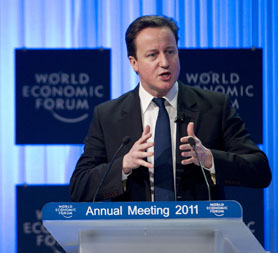Cameron tells Davos: ‘We will see cuts through’
In his first speech as Prime Minister to the World Economic Forum in Davos, David Cameron insists that Britain will stick to the austerity measures and pledges a Budget for growth in the Spring.

In a week that saw the UK economy shrink by unexpected 0.5 per cent, Prime Minister David Cameron presented an upbeat message to some of the world’s most powerful business and political leaders gathered at Davos.
Echoing the comments made from the Bank of England chief, Mervyn King earlier this week, Mr Cameron said that the economic recovery was “always going to be choppy” but that Britain needed to “stick to the course” if it wanted to come through the recession.
He said: “This week we had disappointing growth estimates back home. Yes, they were partly driven by the terrible weather which shut down airports, factories and schools.
“But let’s be frank, they also brought home something we have said for months: given the traumas of recent years, the recovery was always going to be choppy. It’s going to be tough – but we must see it through.
“The scale of the task is immense, so we need to be bold in order to build this economy of the future. The British people know these things. They understand there are no shortcuts to a better future.”
More reports on the UK economy
What is the Plan B for the UK economy?
David Cameron insists he won't change course on the UK economy despite a shock contraction but do we need a "Plan B" to boost growth? Cathy Newman reports as two economists debate for Channel 4 News.
Bank of England chief warns of 'choppy' economic recovery
Bank of England boss Mervyn King warns that grim GDP figures serve as a stark reminder of Britain's "choppy" economic recovery and says Britons should expect "uncomfortably high" levels of inflation.
To worry or not to worry over the economy?
Gary Gibbon blogs on his interview with Vince Cable and asks he if was worried about the state of the economy?
UK economy shrinks by an unexpected 0.5 per cent
The economic recovery of the UK suffers a blow, with a shock contraction of 0.5 per cent in the last three months of 2010. It means a double-dip recession is on the cards, says Faisal Islam.
FactCheck: GDP shock - was it the weather wot done it?
FactCheck looked at George Osborne's claim that the weather had a huge effect on the UK's growth figures.
As well as reaching out to British listeners, Cameron commented on Europe’s ability to compete with growing economies around the world. He warned: “While economies like India, Brazil and China are steaming ahead, in Europe, the drag on growth has persisted.
“Europe has got to earn its way. The world doesn’t owe us a living.”
The Prime Minister suggested that the EU should sign free trade agreements with India, Canada, the Middle East and Latin America – similar to an agreement signed last year with South Korea.
“We in Europe shouldn’t be cautious about world trade, we should be actively, aggressively pushing for it,” he declared.
Mr Cameron repeated his opposition to adopting the Euro but did say that it’s success was vital to Britain’s own interests:
“A Eurozone that doesn’t confront its difficulties is not good for us. It’s as simple as that.”
Faisal Islam blogged earlier this week that work had been done in preparing a Plan B for the UK in response to a potential Eurozone collapse – but that less had been done to safeguard against the Government’s own austerity plan failing.
“The Government is trying to present its judgement as a necessity. The only necessity on cutting early and fast is a political one: the need to blame the previous Government for the pain, and to be in a position to offer tax cuts in 2014 – before the election. Necessity negates the need for a mandate, it seems, particularly for the Lib Dem Cabinet mindbenders.
“Reasonable people – including the Cabinet Secretary – feel preparing a Plan B would be a sensible strategy. (As it happens that work was, I understand, done in response to a possible Eurozone collapse.)”
-
Latest news
-
Russian deputy defence minister charged with ‘particularly large scale’ corruption3m

-
Sunak dismisses questions about defence spend increase4m

-
Post Office chief Vennells knew about IT remote access says former General Counsel4m

-
Teenage girl arrested after school stabbing in Wales3m

-
Ukraine Russia: is the West ready to go to war? – The Political Fourcast36m

-




